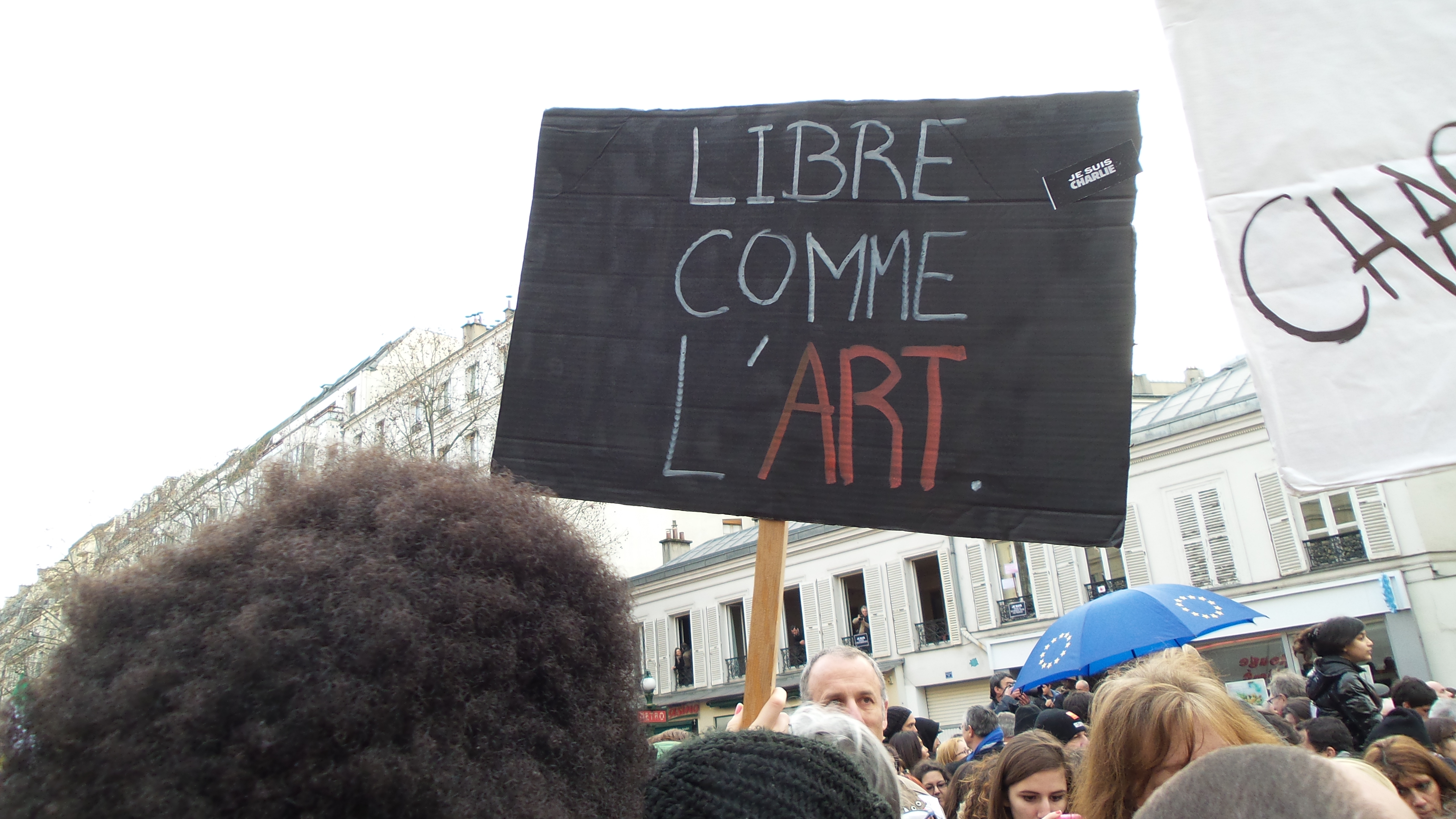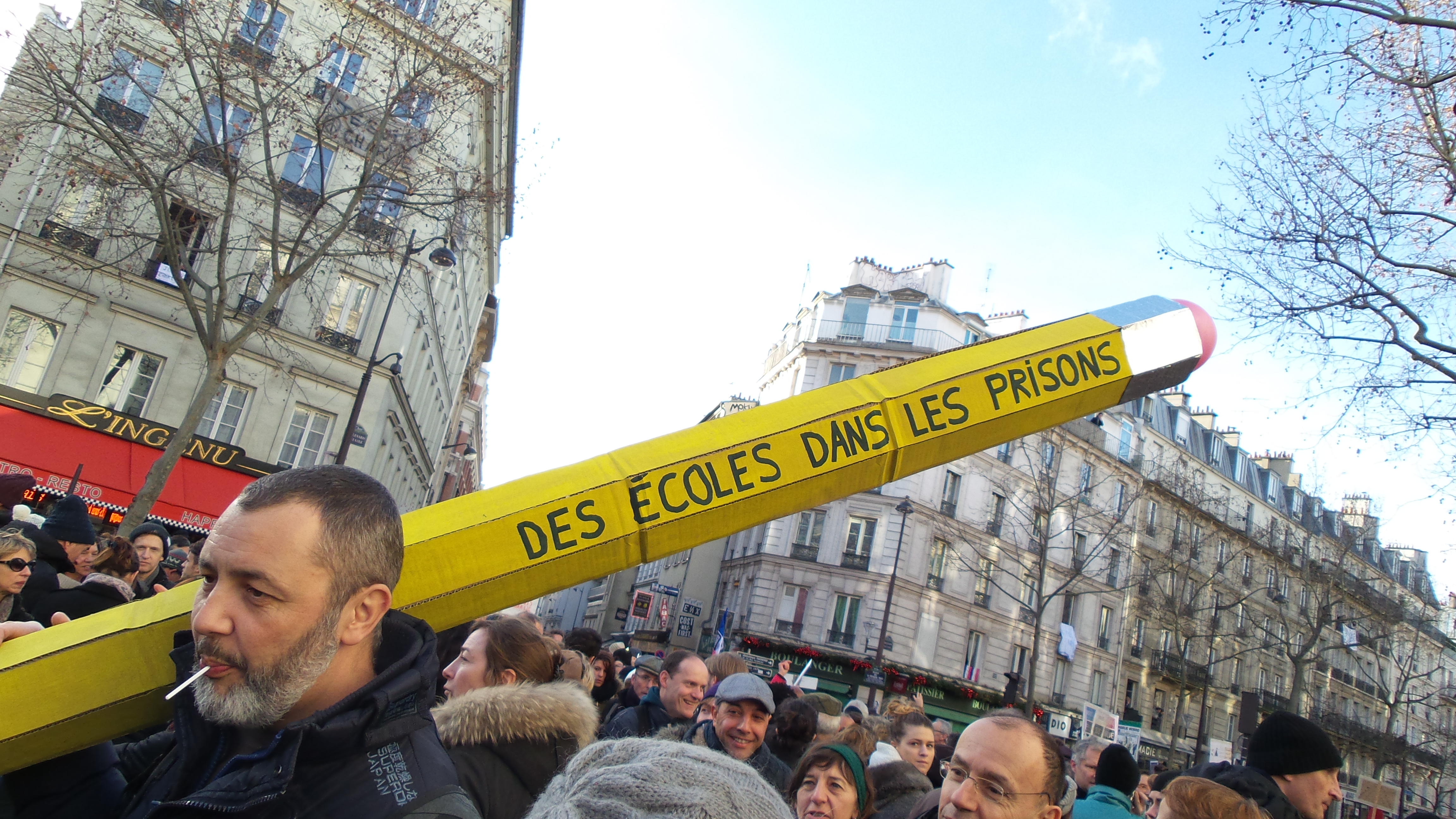
Last Sunday, there was a civic consciousness that allowed 2 million people in Paris and about 4 million people across France to march to express their dissent from violence, hatred, and intolerance.
Some came for Charlie Hebdo to defend its insolence, some came to say that there was something bigger than hatred, bigger than intolerance, and many if not all were convinced that pencils were stronger than rifles. The talk also concerned the abandonment by the State of the suburbs, where the second generation of immigrants live and sometimes is just parked. Not everybody came, of course; many from the suburbs did not join the march.

Nonetheless, the demonstration gathered people from all origins, many more women. They held creative and humoristic signs, many “je suis Charlie”, some pencils were signs too. In the part of the demonstration I was in, a person carried a huge pencil that said schools in prisons. I interviewed the man and the woman who made this pencil. Their point was that it should be a priority to help the youth of the suburbs. He added they come from the suburbs and also from prison because it is often where they land for minor offenses which then become more serious. The man said: “The best way to return to prison is to go there a first time. The United States is a magnificent demonstration that it does not help anything. Over there, the more they build prisons, the more they incarcerate.” The women cited what she attributed with no certainty to Victor Hugo: “A prison that opens is a school that closes”
Another demonstrator said it is difficult to know why they were there, the most important was that they were there. He was aware that the demonstration was not going to solve instantly decades if not centuries of problems. He added religion is intimate; every one makes its own mishmash.
Many signs addressed the defense of second-degree humor. For instance, many had stickers represented and eye with blood that said “Mort de rire” play on words that says literally killed for laughing and means laughing out loud.
People walked with dignity and in silence; this silence that has disturbed for a short instant the world leaders in the back who walked just 100 meters. They all carried with them the images of violence that this crowd was opposing. The French leaders brought their part of ridicule with former president Sarkozy pushing his colleagues to access the front row. At least President Hollande had a moment of dignity when he refused to let political parties utilize the demonstration as a rally. The extreme right party Le Front National was not invited as a party. Its leader Marine LePen did not accept coming as a simple citizen. She organized her own march in thttp://www.womeninandbeyond.org/wp-admin/media-upload.php?post_id=18195&type=image&TB_iframe=1he south of France and gathered only 1000 followers. It is hard to imagine that they had the slightest empathy for the Charlie’s editorial team.
The silence of the march supported the effort for some to understand how this youth was held prisoner in this country, how their reality was forgotten or invisible. JMG Le Clesio, holder of the Nobel Prize for Literature, wrote a letter to his daughter who was in the demonstration. In it, he raises the main issue, how not to forget this people’s inspiration in face of the power of recuperation ready to pit people against each other. Because the perpetrators were French, they were born in France, they were formed in the schools of the republic; a post-colonial republic that let them be enclosed in its suburbs and prisons. In prison they met other powerful people who continued the work of alienation using religious intolerance.
The mechanism of inequality is political. The presence of European leaders was on one hand normal but also a reminder of their responsibility in pushing Europe even more into isolation with its austerity measures. The same leaders have been the instruments of neoliberal policies that are dismantling little by little the social and public service protections. In the past decade, in France this movement of isolation of the suburbs has increased. The previous administration took apart local cultural centers and local police systems that were more inclusive. And the current administration is now cutting funding to associations such as Africa 93 , a feminist organization that worked in the department 93 one of the most critical suburbs in Paris.
In France like in Nigeria or in the United States, women are the first targeted by this violence. Not to forget that powerful manipulations may use a simple phrase “Je suis Charlie” to transform this spontaneity into an instrument of repression and fragmentation.
Knowing that, we can’t stop marching.
